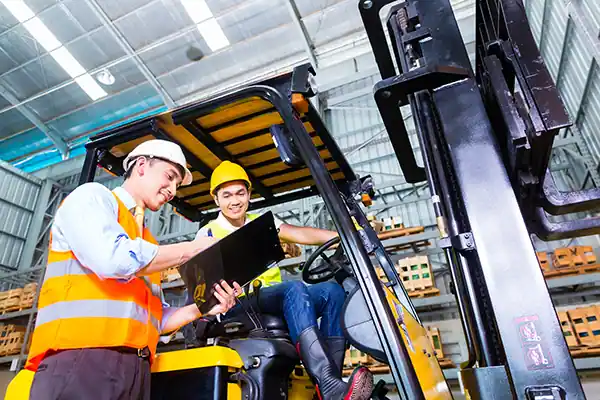BUSINESS
Things to Consider When Buying a Forklift

Purchasing a forklift is a significant investment for any business. Whether you’re expanding your warehouse operations or replacing old equipment, choosing the right forklift requires careful consideration. With a myriad of options available in the market, it’s essential to weigh various factors to ensure you select a forklift that meets your specific needs and budget. Here, we’ll explore critical considerations to remember when buying a forklift, allowing you to make an informed decision for your business.
Assess Your Operational Needs
Before diving into the buying process, you should take the time to assess your operational requirements. Consider factors such as the type of materials you’ll be handling, the height and weight of loads, and the layout of your facility. Different forklift models are designed for specific applications, from narrow-aisle reach trucks to heavy-duty counterbalance forklifts. By understanding your operational needs, you can narrow down your options and choose a forklift tailored to your needs and workflow.
Operation needs may vary depending on your industry:
- Warehouse and Distribution Centres: Efficiency in tight spaces is essential; narrow-aisle and high-reach electric forklifts are favoured for indoor use due to zero emissions and quiet operation.
- Construction Sites: Rough terrain and diesel-powered forklifts are necessary for outdoor conditions, providing the required torque and lifting capability for construction materials.
- Manufacturing Facilities: Counterbalance forklifts offer versatility for various tasks. Electric or LPG models minimise emissions in indoor settings.
- Retail and Supermarkets: Small, manoeuvrable electric forklifts are ideal for navigating crowded spaces quietly, with pallet jacks or walkie stackers for lighter loads.
- Food and Beverage Industry: Hygiene is crucial; electric forklifts ensure clean operation. Cold storage compatibility and smooth handling are necessary for fragile goods.
- Chemical and Hazardous Materials Handling: Specialised forklifts with protective features and explosion-proof designs are essential for safely handling hazardous materials.
- Recycling and Waste Management: Durable forklifts with attachments are used for material handling, with electric models preferred for their environmental and cost benefits.
- Agriculture and Farming: Forklifts capable of outdoor operation with versatile attachments suit the agricultural sector. Diesel models offer power and efficiency.
Evaluate Your Budget
Budget considerations play a crucial role in the forklift buying process. Determine your budget constraints and explore forklift options that align with your financial limits. Whilst it’s tempting to opt for the cheapest option upfront, you should remember to consider the total cost of ownership, which includes maintenance, repairs, and operating expenses over the lifespan of the forklift. Investing in a higher-quality forklift may yield long-term cost savings through improved reliability and efficiency.
Consider Load Capacity and Lift Height
The load capacity and lift height of a forklift are critical factors to consider based on your handling requirements. Evaluate the weight and dimensions of the heaviest loads your forklift will need to lift, ensuring that the chosen model can handle your typical workload safely and efficiently. It’s important to consider the vertical reach you require for stacking and storing materials in your warehouse. Choosing a forklift with the appropriate lift height ensures optimal productivity and versatility in your business operations.
Evaluate Power Sources
Forklifts are available with various power sources, including electric, diesel, petrol, and LPG. Each power source offers distinct advantages and considerations based on your operational environment and preferences. For example, electric forklifts are ideal for indoor use, offering quiet operation, zero emissions, and lower maintenance requirements. Diesel and petrol forklifts are better suited for outdoor applications and heavy-duty tasks, providing greater torque and longer runtime. Evaluate your facility’s infrastructure and operational needs to determine the most suitable power source for your forklift.
Consider Ergonomics and Operator Comfort
Employee safety and comfort are paramount when selecting a forklift. You should consider choosing a forklift model that prioritises ergonomic design features, such as adjustable seats, intuitive controls, and ergonomic handlebars. A comfortable and ergonomic working environment can even reduce the risk of fatigue and injury during long shifts. Look out for forklift models with safety features such as visibility enhancements, automatic braking systems, and integrated safety sensors to minimise the risk of accidents and injuries in your workplace.
Explore Maintenance and Service Support
Regular maintenance is essential to keep your forklift running smoothly and maximise its lifespan. Before purchasing, ask about the availability of maintenance services and spare parts for your forklift model. Partnering with a reputable supplier who offers comprehensive maintenance packages and responsive service support ensures that your forklift remains in peak condition, minimising downtime and maximising productivity.
Making an Informed Decision when You Buy a Forklift
Choosing the right forklift for your business is an important decision that requires careful consideration of various factors. By assessing your operational needs, evaluating your budget, and considering factors such as load capacity, power sources, and operator comfort, you can select a forklift that enhances efficiency and productivity in your workplace.
BUSINESS
Tips for Choosing the Right Yard Waste Dumpster Rental

When it comes to managing yard waste, having the right dumpster rental can make a world of difference. Whether you’re tackling a landscaping project or simply cleaning up your outdoor space, having a convenient and efficient way to dispose of yard waste is essential.
With numerous options available, it’s important to know what to look for when choosing a yard waste dumpster rental.
Here are some valuable tips to help you make the right decision.
Assess Your Needs
Before you dive into searching for a yard waste dumpster rental, pause for a second to think about what you need. Think about how much yard waste you think you’ll end up with and the size of the stuff you’re tossing out. This will give you a good idea of what size dumpster you should go for. Rental services usually have different sizes to choose from, so knowing your needs will make picking one a breeze.
Research Local Providers
Before selecting a yard waste dumpster rental, it’s crucial to research local providers thoroughly. Explore this dumpster rental service in Delaware for insights on what to consider when choosing a rental company near you. Delve into reviews, compare pricing, and evaluate services provided. Ensuring you secure the most advantageous deal available while upholding quality is paramount.
Consider Sustainability
Going green is not only good for the environment, but it can also save you money on your rental. When searching for a yard waste dumpster rental, consider asking if they have environmental considerations in their waste management process or if they recycle the waste they collect. This will not only reduce your carbon footprint but may also result in lower fees.
Consider Pricing and Terms
When you’re checking out various yard waste dumpster rental choices, make sure to think about the pricing and terms. Look for clear pricing options with no sneaky fees, and ask about any extra charges for delivery, pickup, or going over weight limits.
Also, keep an eye on how long you can rent it and any rules about what kind of yard waste you can toss in. Knowing the ins and outs of the rental deal will help you dodge surprises and make sure your rental goes without a hitch.
Choose the Right Size
Choosing the perfect dumpster size is key for handling yard waste like a pro. If it’s too small, you’ll end up with overflow and extra charges; too big, you’re overspending. Think about how much waste you’ll have and pick a dumpster size that’s just right. Rental services usually have various options, so you can find the one that suits your needs best.
Prioritize Sustainability
When you’re renting a yard waste dumpster, think about going green. Check out dumpster rental services that give eco-friendly disposal choices like composting or recycling yard waste whenever they can. By picking a provider that cares about sustainability, you’re not just getting rid of waste, you’re helping out the planet too.
Making the Right Yard Waste Dumpster Rental Choice
Picking the perfect yard waste dumpster rental is a must for handling outdoor projects and keeping your outdoor area neat. By figuring out what you need, checking out local options, thinking about costs and terms, finding the right size, and focusing on sustainability, you can make sure renting goes smoothly.
Whether you’re sprucing up your yard or doing some landscaping, choosing the best dumpster rental service in your area will help you manage your yard waste well and in an eco-friendly way.
Share this article and other related content with your fellow readers as you continue exploring the articles on this site.
FINANCE
The Benefits of Utilizing Expert Tax Services for Managing Your 529 Plan

Navigating the complexities of a 529 Plan can feel overwhelming. Especially when considering tax implications. That’s where expert tax services come into play.
But what makes a tax accountant invaluable in this scenario? They bring clarity to intricate tax laws and regulations. By doing so, they ensure you’re compliant and maximizing your savings.
Their guidance becomes a beacon, illuminating the path to financial efficiency. In managing your 529 Plan, the expertise of a tax accountant is indispensable. They turn a daunting task into a manageable and strategic financial decision.
Understanding the Tax Benefits of a 529 Plan
529 plan is a type of savings plan that allows you to invest funds for future education expenses without incurring federal taxes on earnings or withdrawals. Many states offer additional tax incentives for contributing to a 529 Plan.
These can include deductions or credits on state income taxes. It makes it an even more attractive option for families saving for education expenses. Yet, it’s crucial to understand the specific tax benefits of your state’s plan.
It is where expert tax services come in. They have an in-depth understanding of state-specific tax laws and regulations. They take advantage of all available tax benefits.
The Expertise of Tax Accountants in Maximizing Savings
One of the benefits of utilizing expert tax services for your 529 education savings plans is their ability to maximize your savings. Tax accountants have a deep understanding of tax laws and regulations, including those specific to 529 Plans. They can help you navigate the complex tax implications of your contributions, earnings, and withdrawals from the plan.
This knowledge allows them to identify opportunities for tax savings. It ensures that you are compliant with all tax laws related to 529 education savings plans.
By leveraging their expertise, you can make informed decisions. It optimizes your financial benefits and secures your future educational savings.
Strategic Planning for Your 529 Plan
An expert tax service can help you develop a strategic plan for your 529 Plan. They can analyze your financial situation and determine the most helpful ways to contribute, invest, and withdraw funds from the plan.
Tax accountants can also guide how to coordinate 529 Plan contributions with other education-related tax benefits. These includes the following:
- American Opportunity Tax Credit
- Lifetime Learning Credit
Peace of Mind and Ongoing Support
Managing a 529 Plan can be a time-consuming and complex task. By utilizing expert tax services, you can have peace of mind knowing that your plan is being managed efficiently and effectively.
Tax accountants can also provide ongoing support and guidance as your financial situation changes or as new tax laws are implemented. It allows you to focus on other important aspects of your life while still ensuring that your 529 Plan is being managed in the most beneficial way possible.
Discovering the Benefits of Expert Tax Services
Expert tax services make 529 Plans manageable. They decode complex tax issues, revealing paths to savings. Their insight ensures compliance and optimizes your investment.
Affordable tax service transforms daunting tasks into strategic success. It’s about maximizing benefits while minimizing stress. Choose expert tax services for peace of mind.
They safeguard your educational savings, ensuring future success. Remember, investing in expert advice pays dividends in financial health.
Did you find this article helpful? If so, check out the rest of our site for more informative content.
REAL ESTATE
The Cost of Inflation in Construction

Since 2022 inflation has been driving up costs for just about everything, from bread to gasoline to construction costs and manufacturing. At just about every level, cost increases from 10 to 200 percent have been realized, sometimes adding three to four layers onto the original cost from the producer before reaching the final end user or customer. Construction in particular has been significantly hammered by inflation in multiple areas, depending on so many different supplies, skills, trades and products to complete a project. That cost increase ultimately has to get passed on to the commercial or industrial customer who may not be so willing to take on such increases if they can be delayed until the market is more reasonable.
How Can it Be Fixed?
The primary tool used by the government involves reducing the amount of currency in the market, thereby driving up the value of the dollar and reducing inflation’s effect. While easy to say, the implementation aspect is hard. It means increasing the cost of borrowing, making new money more expensive to obtain. Other methods involve reducing the number of income earners generating new value as well. That in turn results in job loss. The list goes on with a singular, common feature – pain. Most solutions for inflation tend to cause more loss, which is why inflation is often feared as a double-damage effect on an economy.
What Can Construction Do as a Solution?
One method of fighting inflation in the construction industry involves finding lower-cost substitutes for supplies and services used. However, this is a bit of a limited option; going too low ends up lowering the quality of the goods or services provided. Since the construction company is ultimately liable for the quality of the entire project delivery, there is a practical floor to how low quality can go before a discounted price isn’t worth taking. After all, the old saying of, “You get what you pay for,” really does apply in construction.
A second method involves financing the inflation as a delay tactic. The thinking here is to let someone else’s money take the hit of inflation through borrowing and, when times are better and currency valuation rises, the financing can be paid off with a lower cost. It is, in essence, gambling that the future will provide a better exchange for the borrower than the cost of the borrowing today. In many cases, this kind of financing out of inflation doesn’t work, and the cost of the construction ends up being far more.
A third method involves maximizing local resources, labor and equipment. While some construction companies insist on bringing all of their resources, cost-sensitive operations focus on finding the resources locally wherever the project happens to be. Again, there is a bit of gambling here; if the resources are not available locally, the company will still have to bring them in to complete the job. At short notice, that could drive the cost higher than if the elements were retained to begin with well in advance.
The Most Sensitive Construction Areas Hit
Among the areas hardest hit, raw material suppliers and equipment fleet managers have been seeing the most noticeable ongoing expense impacts. Fuel for vehicles erodes operating budgets mercilessly. Where construction involves a lot of transport, fuel costs are going to remain a challenge.
Most construction requires raw materials for assembly and end product development. As raw materials go up, the cost of the project increases notably. Materials can reach as much as 60 percent of a construction project’s overall expense, so controlling procurement is essential to protect profit margins. Yet again, the quality issue ties the project’s hands from going too cheap on supplies.
Finally, labor will continue to be a pressure during periods where hiring is difficult. Combined with inflation, deficits in skilled labor and trades can easily drive up salary and wage costs on a project, even with outsourcing and contracting versus direct hires.
Inflation Doesn’t Last Forever, Right?
Much of the expectation in the U.S. is that the current inflation levels will be temporary. However, Japan was a good example where long-lasting economic problems hampered multiple industries for a decade or longer. There’s no rule that says inflation can only last one or two years. Instead, monetary policy tends to be the primary response that makes a difference, reducing supply of currency and increasing economic buying power.

 ENTERTAINMENT4 days ago
ENTERTAINMENT4 days agoExploring the Kristen Archives: A Treasure Trove of Erotica and More

 ENTERTAINMENT1 day ago
ENTERTAINMENT1 day agoKiss KH: The Streaming Platform Redefining Digital Engagement and Cultural Currents

 EDUCATION1 day ago
EDUCATION1 day agoLingrohub Platform: A Complete Student Access Guide

 LIFESTYLE4 months ago
LIFESTYLE4 months agoThe Disciplinary Wives Club: Spanking for Love, Not Punishment

 TECHNOLOGY1 day ago
TECHNOLOGY1 day agoCasibom: The Digital Alchemy Reshaping Systems, Society, and Self

 TECHNOLOGY23 hours ago
TECHNOLOGY23 hours agoSecuring Your Online Presence: The Ultimate Guide to Buying an SSL Certificate

 TECHNOLOGY4 months ago
TECHNOLOGY4 months agoBlog Arcy Art: Where Architecture Meets Art

 LIFESTYLE23 hours ago
LIFESTYLE23 hours agoTips for Prolonging the Lifespan of Truck Roll-Up Door Rollers











